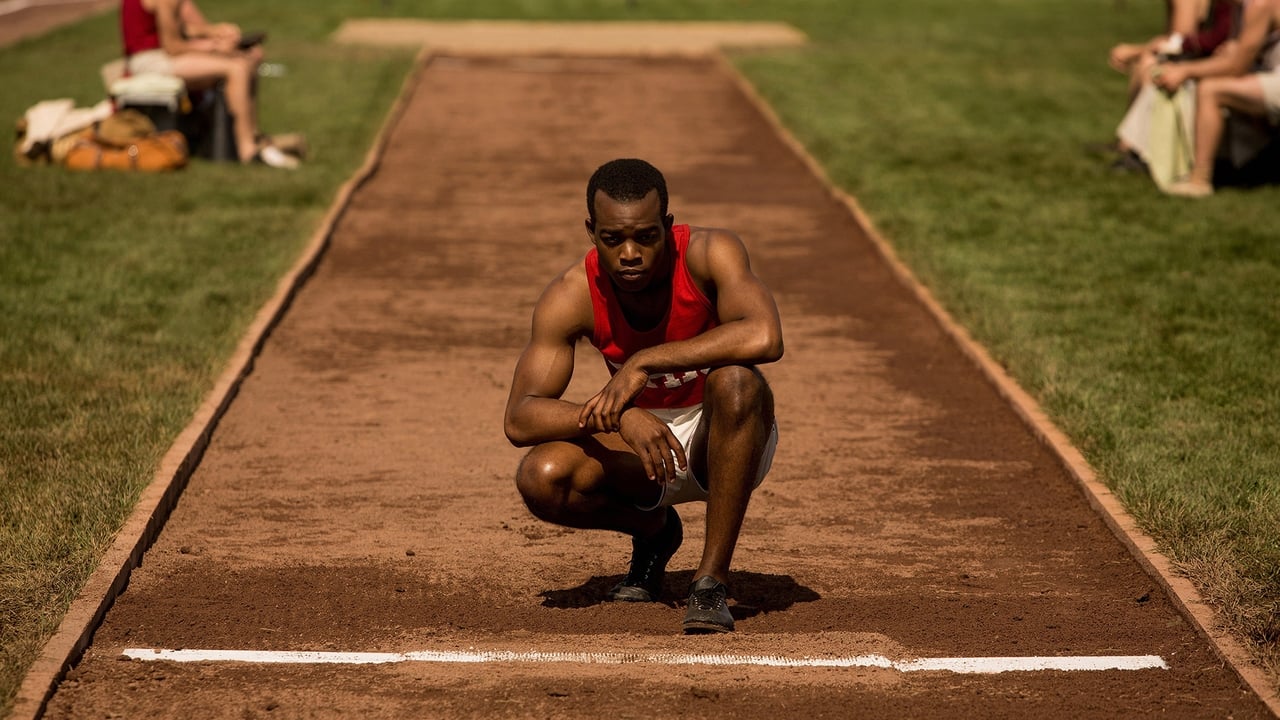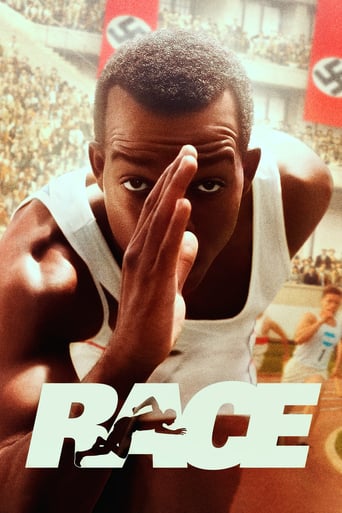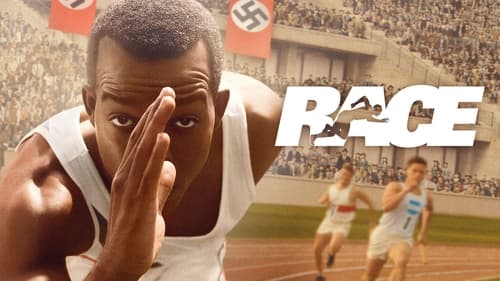



Easily the biggest piece of Right wing non sense propaganda I ever saw.
View MoreMostly, the movie is committed to the value of a good time.
View MoreStory: It's very simple but honestly that is fine.
It is encouraging that the film ends so strongly.Otherwise, it wouldn't have been a particularly memorable film
View More"Race" from 2016, is the story of Jesse Owens and his competing in the 1936 Olympics. The title of course has the double meaning of the challenges Owens met as a black man and the fact that he was a runner. Jesse Owens (Stephan James) becomes a star in track while in college. It was great news for his college, which was on a losing streak and for his coach, Larry Snyder (Jason Sudeikis). Owens even breaks a record during a college championship. The film shows the prejudice and bullying blacks in college faced, as well as displays of prejudice on the team. It's a sad statement - sadder yet because in subtler ways, as we know, it continues. A huge debate was taking place among members of the U.S. Olympic Committee about whether the United States should agree to compete in the Olympics. There are two factions - Avery Brundage (Jeremy Irons), the President of the committee, who has his doubts about the rumors about what is going on in Germany, and Judge Jeremiah T. Mahoney (William Hurt) who is opposed to sending athletes. It is decided that by Brundage, will go to Berlin and assess the situation. He receives a promise that there will be no discrimination during the games.This is an important part of the film and also seems to be a touch inaccurate. Though Brundage agreed to allow two Jewish runners to be cut from the team right before they were to compete, it was not for the reason given in the film. Brundage was actually not a very nice guy. He felt the worst thing in the world was Communism and admired how Germany had come back to power under Hitler and was probably a racist himself. Meanwhile, Jesse was under pressure from the NAACP not to attend.But Jesse goes and wins four medals, to the consternation of Goebbels and Hitler. A big deal was made, then and now, with the fact that Hitler did not shake Owens' hand, although Owens claimed that he did, in front of witnesses, behind the stadium, and Jesse had a photo of it. This hasn't been proved, but it is true that FDR never invited him to the White House, never congratulated him or even sent him a telegram.Owens' victory was a hollow one - he was barred from amateur athletic competition and his promised endorsements dried up. Eventually his life did come together when he was made goodwill ambassador by the government. He remained married to Ruth (Shanice Banton), and they had three daughters together.Two wonderful parts of the film: Owens entering the Olympic field in front of a massive audience, with the Hindenberg flying overhead. The scene really captured how overwhelming it must have been. The other wonderful element was Owens' friendship with fellow German competitor Luz Long, who advised him at one point. Though the film shows a scene of the two getting together and talking during the Olympics, that didn't happen. The two men corresponded and were friends until Long was killed in the war, after which Owens was in touch with his family and grew close to his children.Highly recommended - it's an inspiring film, well acted and directed, in large part true, and one of those triumph of the human spirit stories - which today, we need more than ever.
View MoreI enjoyed this movie but there are a few problems I have with it.I wish they wouldn't have tried to include so many scenes that are meant to explain the history of Nazi Germany and the controversy with the Berlin Olympics. There are scenes that take us far from Jesse and Ohio State track team into conferences with the international Olympic committee and meetings with German diplomats. I personally think that the history of the German Nazi Olympics is knowledge that most people are at least mildly aware of, but even if an audience knows nothing about it, you can tell a story that makes it clear without literally having to show the Olympic meetings. A story about Jesse Owens is a story about Jesse Owens. There are far too many and too long scenes that have nothing to do with him personally.The other major problem I have is the accents. Jesse's accent changes constantly. It goes from general rural African American accent to 2016 Stephan James. Larry Snyder only ever sounds like 2016 Jason Sudekis. It's not right for the place nor the time. It distracts from the movie because all I can hear is funny guy SNL Jason. The acting isn't phenomenal. There's a lot of unnatural dialogue moments. Far too many. But it's not terribly awful. Just awkward and a bit distracting. Historical inaccuracies are a major complaint I see, and while I can understand that, I personally didn't find them to be obviously distracting (aside from Jason sounding like he's doing an SNL skit instead of even attempting any accent.) All other characters accents are random as well. Sometimes they fit, other times the don't. Sometimes it seems like they intentionally wanted to neutralize accents. Overall it's just kinda meh. It's better than average, but they didn't do Jesse justice in forming an emotional connection with him. He's presented in a meh way. You're rooting for him of course but you're not really enthusiastic. i didn't form an emotional connection where I really cared about him. I wish they would've cut the diplomat meeting scenes and used that time to give us more backstory and emotion for Jesse. Disappointing. Could've been great but it just didn't meet my expectation.
View MoreThis true story of an American hero is written by Joel Shrapnel and Anna Waterhouse and directed by Stephen Hopkins – a team that has managed to place before the public one of the finer biographies of a sports superstar as well as a powerful statement about racism in this country and abroad on the screen today. It is filled with excellent and sensitive performances in major and minor roles and the fact that it is not being considered for awards seems oddly uninformed.The title of the film – RACE - is most appropriately chosen as it asks the audience to transpose concepts of sportsmanship to considerations of racial bigotry both of the past and the present. And that works very well indeed. Using the extremes of Nazi Germany extermination of Jews, Blacks, gypsies, gays etc in the name of Aryan supremacy is shudderingly demonstrated, but equally difficult is the manner in which the film places a mirror to America, both in the more blatant era of the 1930s (in schools, restaurants, and African American families) of the hurtful racism that still exists is so important for us to see enacted on the big screen.Briefly, Jesse Owens' quest to become the greatest track and field athlete in history thrusts him onto the world stage of the 1936 Olympics, where he faces off against Adolf Hitler's vision of Aryan supremacy. But more specifically, in the 1930s, Jesse Owens (Stephan James in an Oscar worthy performance) is a young man who is the first in his family to go to college. Going to Ohio State to train under its track and field coach, Larry Snyder (Jason Sudeikis, proving that he is a fine actor in a fine film instead of just another silly goofus as in his usual films), the young African American athlete quickly impresses with his tremendous potential that suggests Olympic material. However, as Owens struggles both with the obligations of his life and the virulent racism against him, the question of whether America would compete at all at the 1936 Olympics in Nazi Germany is being debated vigorously. When the American envoy (Jeremy Irons) finds a compromise persuasive with the Third Reich to avert a boycott, Owens has his own moral struggle about going – not only the race issues but leaving behind his girlfriend (Shannon Banton) and their child. Upon resolving that issue, Owens and his coach travel to Berlin to participate in a competition that would mark Owens as the greatest of America's Olympians even as the German film director, Leni Riefenstahl (Carice van Houten), locks horns with her country's Propaganda Minister, Josef Goebbels (Barnaby Metschurat), to film the politically embarrassing fact for posterity.There are many significant minor roles portrayed by William Hurt, Eli Goree, Jonathan Higgins, Shamier Anderson, and especially David Kross who plays Carl 'Luz' Long – Jesse's German rival with whom Jesse finds support and understanding in a very moving scene. There are many reasons to see this film, or better yet town it to share with others. It is an outstanding achievement with a very important message.
View MoreAttention younger generations:Avery Brundage was an unapologetic and unbending racist Nazi sympathizer. To portray him as this farcical film does, as a hero fighting for Jesse Owens so perverts history that it should be a crime. And, Leni Reifenstal WAS a Nazi and supported Hitler and his actions throughout the war and its buildup without reservation.The main underlying objective of this movie seems to be that Avery Brundage wasn't the renowned corrupt amoral Nazi sympathizer and racist anti-semite that history knows him to have been. For me, one of the most compelling stories in our history was totally ruined by the complete re-writing of history to vindicate the American racist anti-semitic Brundage, one of the most vile, despicable, destructive forces in the history of sport, not just for America but the world. Brundage was absolutely explicit in his contempt for Owens, Jews, and African-Americans, and never made ANY protests over the treatment of Owens or any other American. Additionally, Leni Reifenstal supported the Nazis and Hitler without reservation throughout the regime, and if she indeed prevailed to film Owens, it was for the sake of the film, not because she rejected Hitler's racism and anti-semitism.Why the history lesson and very little about the film? Because films like this which pervert history distort this and future generation's understanding of the times and the people. Everything but the fictional propaganda of a script, full of more lies than Trump and Clinton told all year, and ending with a totally fabricated meeting between Owens and Reifenstal, one last attempt to rescue her reputation and bastardize history.This is appalling piece of film making. Beautifully told lies are still lies, and this film is one gigantic lie.
View More